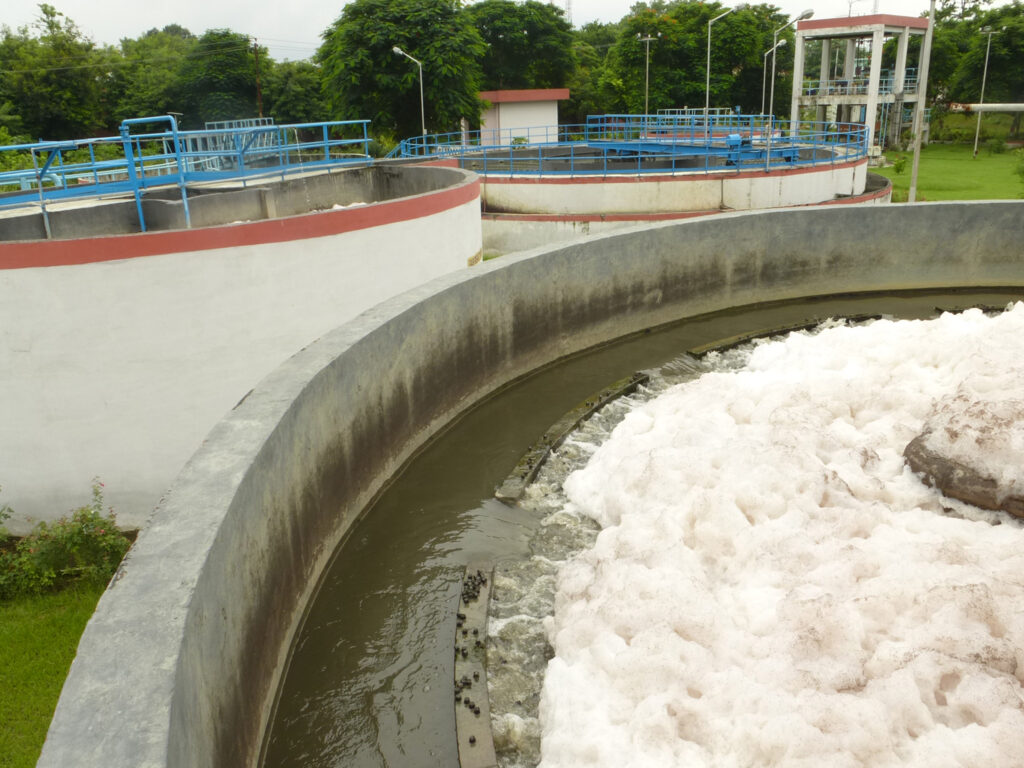Treated Wastewater Reuse Could Cut 1.3 Million Tonnes Of Emissions
Mar 31, 2023 | Pratirodh Bureau
A sewage treatment plant in Lucknow. Reusing treated wastewater in irrigation in India could have reduced greenhouse gas emissions by 1.3 million tonnes in 2021, according to the latest study by the Council on Energy, Environment and Water. The study also found that reusing treated wastewater in irrigation in India could have reduced greenhouse gas emissions by 1.3 million tonnes in 2021 (Image: India Water Portal/Flickr)
Reusing treated wastewater in irrigation in India could have reduced greenhouse gas emissions by 1.3 million tonnes in 2021, according to the latest study by a think tank.
Greenhouse gases causing greenhouse effect are one of the main drivers of climate change. As greenhouse gas emissions blanket the Earth, they trap the sun’s heat. This leads to global warming and climate change.
The study by the Council on Energy, Environment and Water (CEEW) looks at mainstreaming the reuse of treated wastewater in the country.
It assesses the economic and market potential for the reuse of treated wastewater (domestic sewage) for irrigation at the national scale and makes recommendations to strengthen the existing governance on reuse.
According to the analysis using the Central Water Commission (CWC) estimates, 11 out of 15 major river basins in India will experience water stress by 2025, with annual per capita renewable water availability below 1,700 cubic metres.
“Hence, it is essential to explore alternative sources of water to address the demand-supply gap,” the CEEW said in the new study.
The study also found that reusing treated wastewater in irrigation in India could have reduced greenhouse gas (GHG) emissions by 1.3 million tonnes in 2021.
“Our analysis suggests that the available treated wastewater would have irrigated 1.38 Mha in 2021, which would have reduced pumping in 3.5 per cent of the groundwater-irrigated area. Further, this would have led to a reduction of 1 million tonnes of GHG emissions. Additionally, on account of the inherent nutrient value of treated wastewater, fertiliser consumption would have reduced, resulting in further reduction of GHG emissions by 0.3 million tonnes,” it said.
The market value of the total available treated wastewater in 2021 was Rs 630 million, if there was a mechanism in place to sell the treated wastewater to different sectors for reuse. “The market value will substantially increase to over Rs 830 million in 2025 and Rs 1.9 billion in 2050 at the current market rate,” the study found.
The study said nine times the area of New Delhi could have been irrigated using the treated wastewater available in India for the irrigation sector in 2021. “Further, about Rs 966 billion would have been the revenue generated from the agricultural yield produced from this area of land,” it said.
Over 6,000 metric tonnes (MT) of nutrients could have been recovered from the available treated wastewater in 2021, generating savings of more than Rs 50 million on account of the corresponding reduction in synthetic fertiliser use, it said.
India, presently, treats only 28 per cent of the total sewage it generates per day from the urban centres (CPCB 2021). Out of the 72,368 million litres per day (MLD) of sewage produced in urban centres, the actual treatment is of only 20,236 MLD (CPCB 2021).
Class I cities (those whose population is above 1,00,000) and class II cities (with populations of 50,00099,999), which represent a major share (72 per cent) of the total urban population, produce an estimated 38,254 MLD of sewage, of which only 30 per cent is actually treated (CPCB 2021). The untreated wastewater is then discharged into freshwater bodies such as rivers.
The study said given the exponential amount of wastewater generated in the country, India has immense potential to meet the growing water demand across different sectors and improve the water environment with proper management.
“Through this study, we intend to estimate the market potential for the reuse of treated wastewater (domestic sewage) at the national scale and make recommendations to strengthen the existing governance on reuse,” it said.
The study pointed out that only a few states have identified the positive externalities associated with the treatment of wastewater and reuse.
These include improvement in the water quality of receiving natural water bodies and the associated public health impacts, it said. The study also pointed out that there are only a few policies that prioritise sectors for reuse.
“Also, only a few policies classify treated wastewater (TWW) into ‘mandatory’ and ‘non-mandatory’ reuse. Most policies make only a brief recommendation on the technologies for wastewater treatment. A majority of the state policies that we reviewed do not provide details on the treatment process and technologies,” it said.
